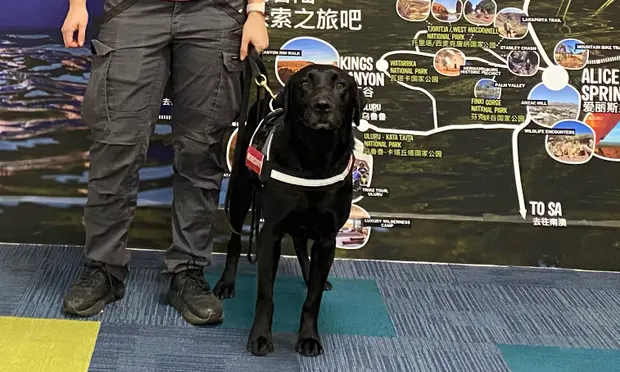Zinta the black labrador’s nose didn’t let her down as Australia beefs up airport biosecurity after Indonesian foot-and-mouth disease outbreak

Zinta was new on the job as a biosecurity detector dog and may have felt the weight of Australia’s $80bn agriculture industry on her sleek black shoulders, or rather, her keen wet nose.
That nose managed to sniff out what would become a passenger’s most expensive McDonald’s breakfast, two egg and beef sausage McMuffins and a ham croissant bought in Bali and brought in a backpack into Australia.
Zinta’s discovery of the undeclared meat at Darwin airport last week led to the traveller returning from Indonesia being whacked with a $2,664 fine, amid strengthened biosecurity measures at Australian airports since the highly contagious foot-and-mouth-disease (FMD) was detected in Bali.
Murray Watt, the minister for agriculture said “this will be the most expensive Macca’s meal this passenger ever has, this fine is twice the cost of an air fare to Bali”.
However, he had “no sympathy for people who choose to disobey Australia’s strict biosecurity measures, and recent detections show you will be caught”.
It comes after an Australian woman was fined $2,664 for failing to declare a Subway sandwich at the airport after returning from Singapore.
Zinta the black labrador is part of a new $14m biosecurity package introduced at the beginning of July after the Indonesian outbreak of FMD, which included detector dogs operating at Darwin and Cairns airports, sanitation foot mats at all international airports, frontline defences in mail centres, and support for Indonesia and neighbouring countries.
FMD causes blisters in cloven-hoofed animals but the effects of it entering Australia would be far more widespread, with the culling of animals and shutdown of Australia’s export market overnight, which would cost the nation $80bn, according to the Australian Bureau of Agricultural and Resource Economics and Sciences.
“Biosecurity is no joke – it helps protect jobs, our farms, food and supports the economy,” Watt said.
Australia has only to look to what happened in 2001 in the UK – piles of culled farm animals set alight, villages locked down, regional economies crippled – to know Watt is not exaggerating.
“Passengers who choose to travel need to make sure they are fulfilling the conditions to enter Australia, by following all biosecurity measures,” Watt said.
Watt said “Zinta was placed at Darwin airport as part of the Albanese government’s tough new biosecurity defences, and it’s excellent to see she is already contributing to keeping the country safe”.
The seized meat products will be tested for FMD before they are destroyed, authorities said.
Authorities say the passenger was issued a 12-unit infringement notice for failing to declare potential high biosecurity risk items and providing a false and misleading document.
… as you’re joining us today from Vietnam, we have a small favour to ask. Tens of millions have placed their trust in the Guardian’s fearless journalism since we started publishing 200 years ago, turning to us in moments of crisis, uncertainty, solidarity and hope. More than 1.5 million supporters, from 180 countries, now power us financially – keeping us open to all, and fiercely independent.
Unlike many others, the Guardian has no shareholders and no billionaire owner. Just the determination and passion to deliver high-impact global reporting, always free from commercial or political influence. Reporting like this is vital for democracy, for fairness and to demand better from the powerful.
And we provide all this for free, for everyone to read. We do this because we believe in information equality. Greater numbers of people can keep track of the events shaping our world, understand their impact on people and communities, and become inspired to take meaningful action. Millions can benefit from open access to quality, truthful news, regardless of their ability to pay for it.
Every contribution, however big or small, powers our journalism and sustains our future. Support the Guardian from as little as $1 – it only takes a minute. If you can, please consider supporting us with a regular amount each month. Thank you.